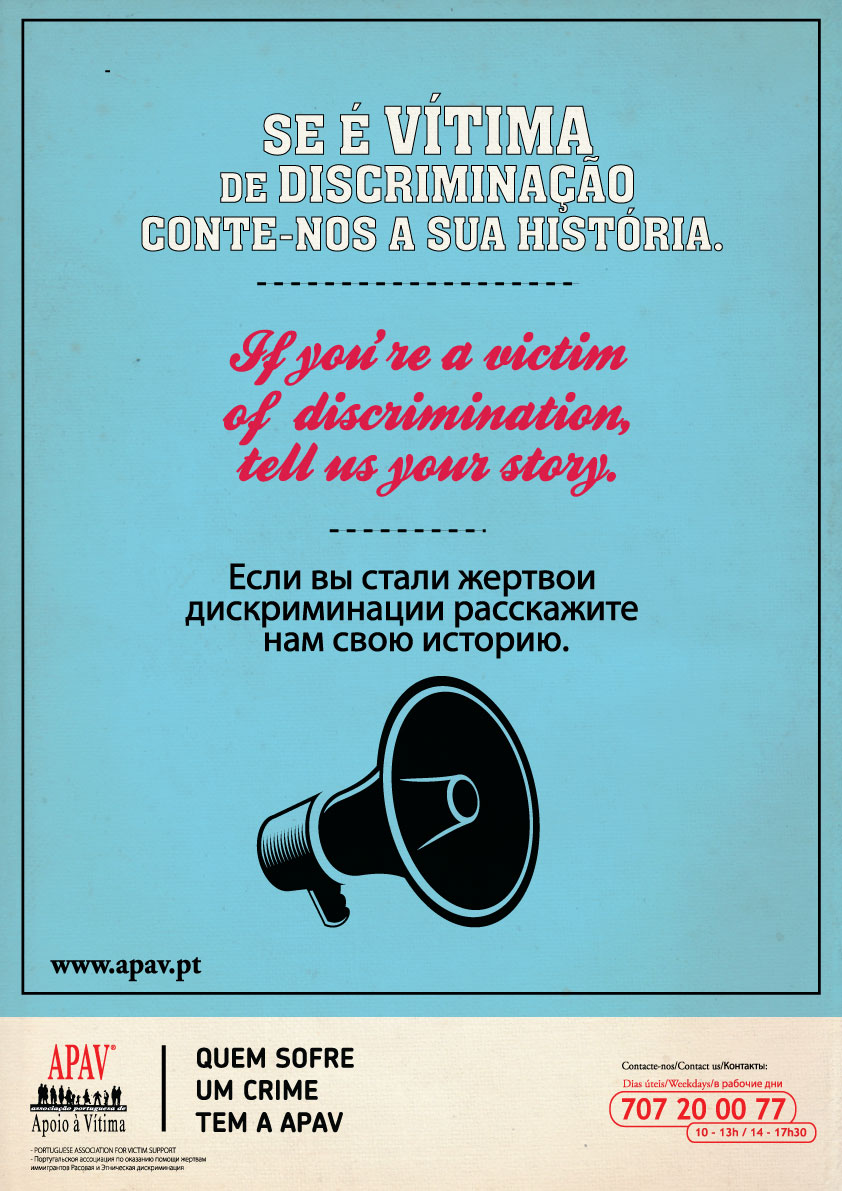
Racial or Ethnic Discrimination
Respecting the principles of equality means not exercising any discrimination, be it direct or indirect, against a person or group of people. Discrimination happens when an act or omission leads to differential treatment of a person or a group of people with reasons pertained to race, skin colour, sex, nationality, ethnic origin, sexual orientation, gender identity, or other factors.
Discrimination can be direct or indirect:
- Direct – happens when a person receives less favourable treatment than other people due to their racial origin, ethnicity, nationality or other characteristics. For example, a property owner who refuses to rent out to foreigners is practicing direct discrimination.
- Indirect – happens when there is a tendency, criteria or practice – which should be neutral – that situates a person in a disadvantaged position compared to other people based on racial origin, ethnicity, nationality or other characteristics. For example, a company only promotes employees who speak Portuguese ‘without an accent’. This criteria in reality is neutral, but it is used to exclude employees who do not speak Portuguese as their native language (especially when the work to be performed does not require one to have good diction as translators for instance would need).
However, the law states that an action is not considered to be an act of discrimination whenever the nature of the activities or context of the work requires justifiable discrimination based on legitimate objectives and proportional requirements. As well, it is not against the law if the discrimination actually benefits discriminated persons (this is called, ‘positive discrimination’).
Portuguese law considers certain discriminatory behaviours as an administrative offence and others as criminal offenses, according to their gravity and the legal right(s) affected.
Discrimination as a crime is written in the Portuguese Penal Code, and is punishable by a penalty, which can either be serving time in prison or being issued a fine. Discrimination is always considered a crime when there exists an organisational structure or form, or a disclosure of materials that incite discrimination, hate or violence against a person or group of people based on their race, colour, ethnic origin, nationality, religion, sex, gender identity or sexual orientation.
Still, under the scope of crimes in which we label as hate crimes, they can be defined as an effective practice or violent act motivated by factors based on the victim’s certain characteristics (like racial origin, sexual orientation, or nationality, for example), or those pertaining to a specific group (for instance, people who follow a particular religion). This type of racist motivation or preconception can lead to a heavier legal punishment, as the crime committed is considered to be aggravated (such as aggravated assault or aggravated homicide).
On the other hand, discrimination as an administrative offense is not as great in gravity as criminal conducts. Discriminatory acts are considered as offenses related to the exercising of the right to goods and services, to work and professional training, to education and to systems of public and private health, and are punishable by a fine that the convicted person has to pay to the State.
Here are some examples of situations where discriminatory practices are considered administrative offenses under the law:
- Refusing the access to goods and services (for example, refusing to serve a meal at a restaurant for people of a certain racial or ethnic origin)
- Preventing or restricting access to or normal exercise of an economic activity (like in the case of employers who do not hire employees who are foreigners or of a certain racial origin)
- Refusing to sell, rent or sublet a property, or making it more difficult for people to buy, rent or sublet a property (for example, landlords who refuse to rent out property to foreigners)
- Refusing access to public locations or publicly open places (for example, refusal of entry to shows or discos based on discriminatory motives)
- Refusing or restricting access to health care provided by public and private health establishments (for instance, a health care worker who denies a person’s application to a health centre because the person is a foreigner)
- Refusing or restricting access to educational institutions - public or private education (like refusing to register or enroll a student who is ethnically Romani.)
- The establishment of classes or the adoption of other measures of internal organisation in educational establishments of public or private education according to the criteria of racial discrimination (for instance, creating a group of foreign students or students of a particular race or ethnicity. It is discriminatory to create such racial exclusions, unless this is done for the benefit of those students themselves, as in the case for learning Portuguese as a second language.)
- The adoption of practices or measures by any agency, official or employee of the direct or indirect management of the State, Autonomous Regions and local authorities, that conditions or limits the exercise of any right (such as having a City Hall or Municipal Office prohibit foreign nationals from applying for social housing)
- The adoption of an act that, either publicly or with the intention of full disclosure, issues individually or collectively a statement or conveys information in such a way that a group of persons are threatened, insulted or degraded on the grounds of racial discrimination (for example, the director of a company provides an interview in the media, saying that he does not accept job applicants of a particular nationality because they are all ‘lazy’ to him).









